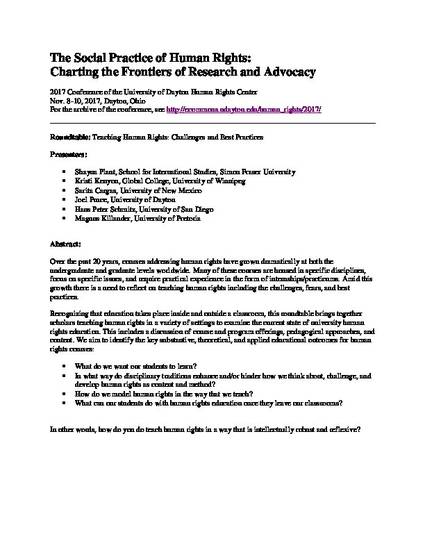
- human rights education,
- ethics of human rights,
- activism,
- higher education,
- teaching
Over the past 20 years, courses addressing human rights have grown dramatically at both the undergraduate and graduate levels worldwide. Many of these courses are housed in specific disciplines, focus on specific issues, and require practical experience in the form of internships/practicums. Amid this growth there is a need to reflect on teaching human rights including the challenges, fears, and best practices.
Recognizing that education takes place inside and outside a classroom, this roundtable brings together scholars teaching human rights in a variety of settings to examine the current state of university human rights education. This includes a discussion of course and program offerings, pedagogical approaches, and content. We aim to identify the key substantive, theoretical, and applied educational outcomes for human rights courses:
- What do we want our students to learn?
- In what way do disciplinary traditions enhance and/or hinder how we think about, challenge, and develop human rights as content and method?
- How do we model human rights in the way that we teach?
- What can our students do with human rights education once they leave our classrooms?
In other words, how do you do teach human rights in a way that is intellectually robust and reflexive?
- Adult and Continuing Education,
- Bilingual, Multilingual, and Multicultural Education,
- Curriculum and Instruction,
- Curriculum and Social Inquiry,
- Educational Administration and Supervision,
- Educational Assessment, Evaluation, and Research,
- Educational Leadership,
- Educational Methods,
- Higher Education Administration,
- Higher Education and Teaching,
- Human Rights Law,
- International and Comparative Education,
- Legal Education and
- Scholarship of Teaching and Learning
Available at: http://works.bepress.com/joel_pruce/5/
